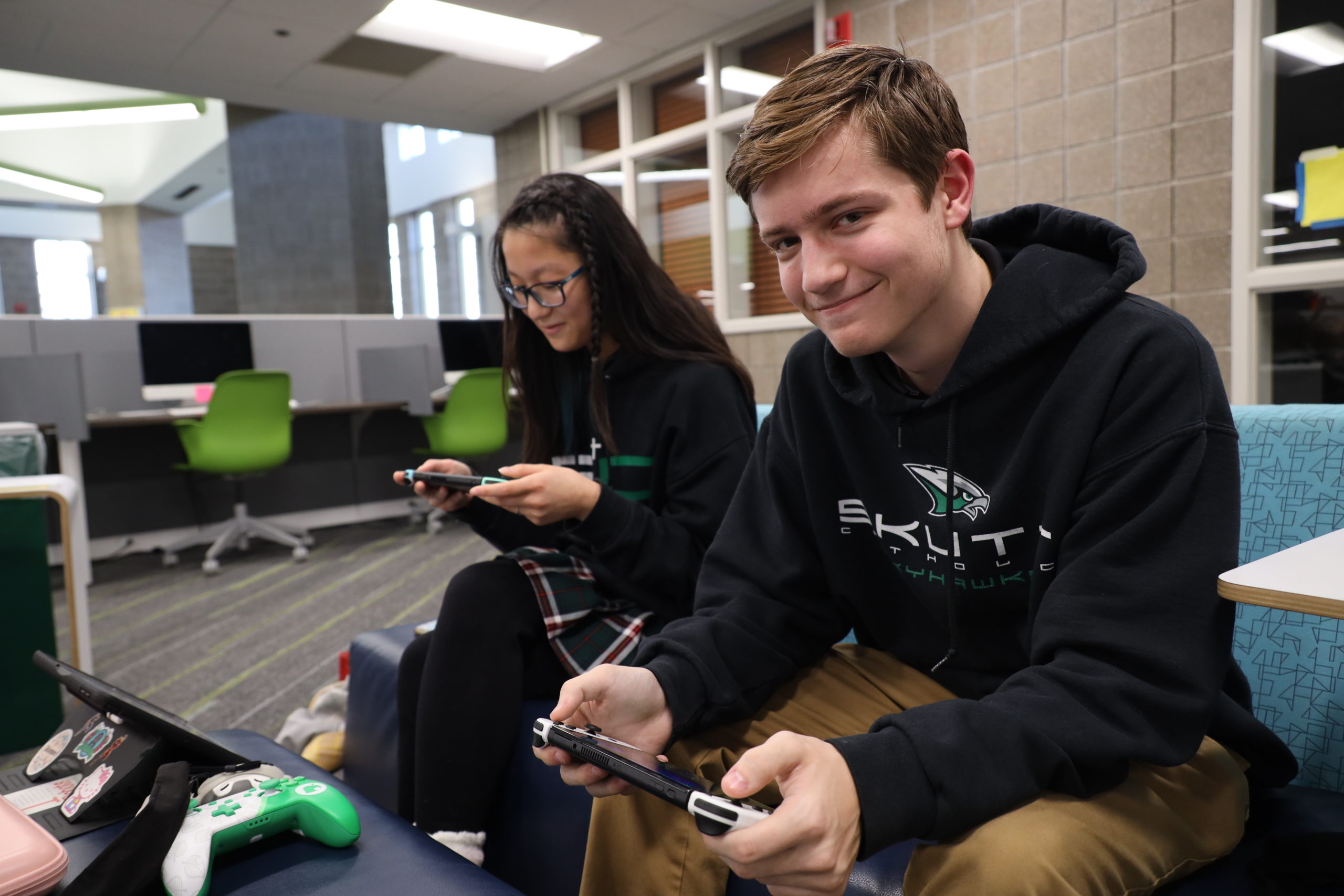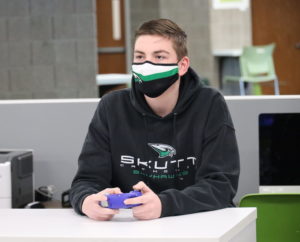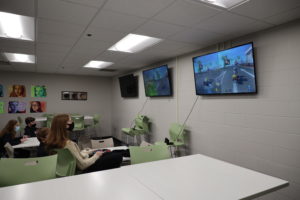
Omaha Skutt juniors Lilian Titus, left, and Ryan Bussom test their gamer skills with a game of Nintendo Switch. JIMMY CARROLL/STAFF
News
The rise of esports benefits high school gamers on multiple levels
January 14, 2022
This month, the Catholic Voice salutes archdiocesan Catholic schools and those operated by religious orders as we prepare to observe Catholic Schools Week Jan. 30 through Feb. 5. With the theme “Catholic Schools: Faith, Excellence, Service,” the nationwide effort recognizes and celebrates the achievements of our Catholic schools and the valuable contributions they provide to young people, as well as our Church, communities and country.
This article is the second of several planned for this month to highlight some of the people and programs that make Catholic education special. Check back for more stories throughout the month.
Teens who play video games were once viewed as socially awkward loners who preferred screen time over interacting with kids their age. This stereotype is less common today, thanks in part to the meteoric rise of esports.
Joe Koneck-Wilcox teaches at V.J. and Angela Skutt Catholic High School in Omaha and serves as co-coach of the school’s esports (short for electronic sports) team. Koneck-Wilcox grew up playing video games and is thrilled that the perception of the type of kid who plays video games is changing.

Junior Noah Coon plays Super Mario Smash Bros with his Nintendo Gamecube controller. JIMMY CARROLL/STAFF
“I’m from a generation where, ‘Oh, what are you doing? You should be outside.’ ‘Oh, what’s wrong with you? Why aren’t you out there playing football?’” he said. “And I loved playing sports, but they are not for everyone.”
Matthew Graves, a senior at Skutt and captain of its esports team, said that playing video games is anything but isolating. Instead, it offers players a sense of community.
“Honestly, I love it when we just come together and have fun and play games,” Graves said.
In 2018, the National Education Association (NEA) recognized esports as an official sport. Since then, almost 9,000 high schools across the country have started video-gaming teams. Competitors can earn college scholarships through their prowess in video games like Mario Kart, Overwatch and others.
The NEA reports that in 2020, more than $16 million in esports scholarships were awarded by U.S. colleges. Two members of last year’s esports team at Skutt now play in college. Others have been offered scholarships.
The University of Nebraska-Omaha (UNO) doesn’t have an esports team, but if Graves decides to attend the school in the fall, that could change.
“I am thinking about going to UNO and majoring in computer science, but I don’t think they have an esports club, so I am planning on starting one there,” Graves said. “I know a lot of people that are going to UNO might want to do it, too.”
Skutt is a member of NSeSA (Nebraska Schools Esports Association) along with some other Catholic schools. Other Catholic high schools are part of the (HSEL) High Schools Esports League. Competitors in both leagues develop game strategies and practice together to improve their skills and become more competitive – the same things basketball and soccer teams do.
Regular season play begins in September. Member schools are paired for weekly competitions and also have the opportunity to participate in periodic tournaments. Many schools also organize scrimmages with one another to play just for fun.
“The nice thing about video games is that we can still be competitive, still be cooperative, and still have those espirit de corps ideals,” Koneck-Wilcox said. “Students are learning strategies, learning communication, and certainly learning teamwork and networking skills.”

Omaha Skutt esports players enjoy the thrill of video games in their student center. JIMMY CARROLL/STAFF
Teams from across town or across the state can compete without driving to different locations. They also can get to know one another while staying safe.
“NSeSA does a really good job,” Koneck-Wilcox said. “We have no toxic behavior or curse language, things like that. We encourage games that are not ultra-violent. All of our games have some strategy base to them. And none of them are too hyper-realistic for overt sexuality or overt violence.”
Omaha’s Marian High School started an esports team last year. There are seven members on the current team, but Coach Tim Barth expects that number to grow once more girls learn about the team.
Daniel J. Gross Catholic High School in Bellevue is putting a team together for the first time this year and already has about 10 members. Mount Michael Benedictine School in Elkhorn, and Omaha’s Roncalli Catholic and Creighton Preparatory high schools are just some of the other Catholic schools in the Archdiocese of Omaha with esports teams.
Barth describes Marian’s esports team as organized enough to offer consistency but laid back enough so the girls can just have fun. It also is a way for some girls who aren’t into sports or don’t have other outlets to have a good time and make new friends.
“I have one girl who doesn’t have video games at home, and so she loves coming so she can just play and have fun,” he said. “It also brings together girls who might not otherwise have crossed paths and new friendships have formed.”
While Marian isn’t winning competitions just yet, they are improving.
“I don’t think the girls get down and out when they lose, but when they get close to winning, it’s pretty exciting,” Barth said.
Last year, Skutt’s esports team had about 25 members. This year, it has 45. Boys outnumber girls about three to one.
“We do have some very talented young ladies, but I would say for the most part it is the young men who are interested in it,” Koneck-Wilcox said.
While there are more boys than girls on the Skutt team, that doesn’t mean girls play video games less than boys. Koneck-Wilcox estimates that 90% of Skutt’s student body plays video games.
Barth has received no pushback from parents whose daughters are interested in esports. On the contrary, when he was promoting esports at Marian’s open house, there were a lot of curious parents.
“I was explaining games, and the parents were all like, ‘wow, you compete,’” he said.
For those parents who might be worried about their high schooler playing too many video games, Skutt senior Graves would tell them that the games they play as a part of esports foster critical thinking skills and help students learn how to communicate as part of a group.
“That’s one of the things that I’ve realized through esports,” Graves said. “There’s more to video games than just video games.”